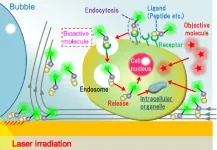(Press-News.org) Promoting physical activity and other behavioural support can help people wanting to reduce their smoking to quit in the short-term.
However, after nine months, physical activity delivers no noticeable benefits – compared with offering no additional support – in the rates of people stopping smoking, according to the findings of a major national study.
The Trial of physical Activity and Reduction of Smoking (TARS) study, led by the University of Plymouth with funding from the National Institute for Health and Care Research, took place across four cities – Plymouth, Nottingham, Oxford and London – before the COVID-19 pandemic.
Its aim was to provide a definitive answer as to whether future NHS services should be adapted to provide additional support to smokers not ready to quit but who do wish to reduce their smoking, with the hope of increasing sustained abstinence from smoking and associated health benefits.
The study also sought to look into previous suggestions that behavioural support for these smokers can lead to smoking reduction and more attempts to quit.
To answer these questions, half the 915 smokers recruited into the study were offered up to eight, weekly face-to-face or phone motivational support sessions to reduce their smoking and increase moderate to vigorous physical activity. It was an approach which had previously shown encouraging signs in a Plymouth pilot study, and was contrasted against the other half of participants who were offered the usual NHS advice on quitting.
The study showed that engaging with the motivational support had some short-term benefits, with 19% of those receiving the additional support saying they had at least halved the number of cigarettes smoked by three months – 14% had still halved their smoking after nine months. By contrast, around 10% of those receiving the standard advice reported having halved their cigarette intake at both milestones.
However, just 2% of those who received the additional support had abstained from smoking between three and nine months. Less than 1% of those receiving the standard advice managed to abstain from smoking for those six months.
In addition, while after three months people receiving the additional support took part in 81 minutes more physical activity each week than those receiving no support, researchers did not find evidence of sustained differences in physical activity at nine months.
With the additional support costing health services in the region of £240 per person, the study’s authors say their findings show the approach is neither effective for long-term smoking cessation or cost-effective.
The research, published in the journal Addiction, also involved the University Hospitals Plymouth NHS Trust, St George’s University of London, University of Oxford, University of Nottingham, University of Exeter, and Plymouth City Council.
Adrian Taylor, Professor in Health Services Research within the University of Plymouth’s Peninsula Medical School, is the study’s lead author. He said: “Generally, the smokers in our study were enthusiastic about the support they received to help reduce their smoking and increase physical activity, which avoided pressuring them to quit. However, they were unable to maintain increases in physical activity and smoking reduction did not lead to more smokers giving up completely, which is the best thing for an individual’s health. Helping smokers to move from wanting to reduce to quitting completely is far more challenging than other less rigorous studies had suggested.”
“This is a further demonstration of the scale of the challenge facing society if we are to achieve the UK Government’s stated aim of being smoke free by 2030. However, it is potentially only through additional difficult national policy decisions such as even higher taxation on tobacco, the subsidised promotion of vaping, and increasing the legal age of tobacco purchasing, in line with other countries such as New Zealand, that the huge costs of smoking for our NHS Services will be reduced.”
END
Physical activity and tailored support fails to deliver lasting benefits for smokers not ready to quit
2023-03-06
ELSE PRESS RELEASES FROM THIS DATE:
Death rates from lung cancer will fall overall in the EU and UK in 2023, but rise among women in France, Italy and Spain
2023-03-06
A total of 1,261,990 people will die from cancer in 2023 in the EU (EU-27). A further 172,314 people will die from the disease in the UK, according to new research published in the leading cancer journal Annals of Oncology [1] today (Monday).
Researchers led by Carlo La Vecchia (MD), a professor at the University of Milan (Italy), estimate there will be a 6.5% fall in cancer death rates in men and a 3.7% fall in women between 2018 and 2023.
They predict that death rates from the ten most common cancers will continue to fall in most European countries in 2023, although the numbers of people dying will go up ...
As urban populations soar wastewater treatment struggles to find sustainable solutions
2023-03-06
Globally, activated sludge treats the majority of urban wastewaters; yet it is one of the most complex biological processes used. It is a sophisticated microbial process fraught with operational problems leading to occasional failures in achieving required effluent quality standards. With the increasing problem of partially treated and raw sewage entering rivers and estuaries, the pressure on the process to cope with ever increasing volumes of wastewater has never been so great.
With increasing volumes of dilute wastewater entering treatment plants the high variability in hydraulic and organic ...
Light-induced acceleration of intracellular delivery
2023-03-06
Cell membranes are barriers that maintain cellular homeostasis, and the intracellular delivery of biologically functional molecules, including peptides, proteins, and nucleic acids to manipulate cellular functions. Conventional intracellular uptake processes require high concentrations of biofunctional molecules with low permeability to pass through the cell membrane. This results in low drug activity because the probability of the biofunctional molecules entering target cells and their organelles is low. In addition, many drugs damage healthy cells as well as the cells that are supposed to target due to poor selectivity, making ...
Physician workforce planning must adjust for aging population, changing practice patterns: New analysis
2023-03-06
Why are Canadians having problems accessing physicians despite historic highs in physician numbers? Factoring in changing demographics and physician work trends can help with physician workforce planning, according to a new analysis in CMAJ (Canadian Medical Association Journal) https://www.cmaj.ca/lookup/doi/10.1503/cmaj.221239.
"[T]he increasing [health care] needs of an aging population have been empirically important since around 2005, while the supply of physician service hours has simultaneously declined in a manner that is largely unrelated to the evolving age–sex composition of the physician workforce," writes Dr. Arthur Sweetman, ...
Pregnant people with schizophrenia have threefold risk of interpersonal violence
2023-03-06
Pregnant and postpartum people with schizophrenia have a more than threefold increase in the risk of an emergency department visit for interpersonal violence, compared with those without schizophrenia, according to a new study in CMAJ (Canadian Medical Association Journal) https://www.cmaj.ca/lookup/doi/10.1503/cmaj.220689.
Interpersonal violence can include physical, sexual and psychological abuse by a family member, intimate partner, acquaintance or stranger.
"Though we found a threefold increased risk for individuals with schizophrenia, we also found that ...
Testing for ApoB protein may be a more accurate marker for heart disease risk than testing for cholesterol alone
2023-03-05
Getting tested for levels of HDL (the good) and LDL (the bad) cholesterol is part of the annual physical exam. But emerging research is showing that these standard tests may not be the most accurate way to test for heart disease risk.
Instead, emerging data suggest that testing for levels of Apolipoprotein B-100 (ApoB), a protein that carries fat molecules, including LDL cholesterol – the so-called “bad cholesterol” – around the body, may be a more accurate risk predictor of atherosclerotic cardiovascular disease, which occurs ...
Alert banners dramatically increase prescribing rates of life-saving heart failure medication
2023-03-05
An automated system that flags which patients could most benefit from an underused yet life-saving cardiology drug more than doubled new prescriptions, according to a pilot program test by researchers at NYU Grossman School of Medicine.
“Our findings suggest that tailored electronic notifications can boost the prescription of life-saving drugs,” said study lead author and cardiologist Amrita Mukhopadhyay, MD, a clinical instructor in the Department of Medicine at NYU Langone Health. “By compiling key information in one place, the system may help providers to spend less time searching through medical records during a visit ...
Cardiovascular risk factor prevalence, treatment, control in young adults
2023-03-05
About The Study: In this study of nearly 13,000 U.S. adults ages 20 to 44, diabetes and obesity increased from 2009 to March 2020, while hypertension did not change and hyperlipidemia declined. The data from this study show a high and rising burden of most cardiovascular risk factors in young U.S. adults, especially for Black, Hispanic, and Mexican American individuals.
Authors: Rishi K. Wadhera, M.D., M.P.P., M.Phil., of the Beth Israel Deaconess Medical Center in Boston, is the corresponding author.
To access the embargoed study: Visit ...
Transcatheter mitral valve repair in heart failure patients significantly reduces hospitalizations and improves survival
2023-03-05
Transcatheter mitral valve repair for heart failure patients with mitral regurgitation can reduce the long-term rate of hospitalizations by almost 50 percent, and death by nearly 30 percent, compared with heart failure patients who don’t undergo the minimally invasive procedure.
These are the breakthrough findings from a new study led by a researcher from the Icahn School of Medicine at Mount Sinai. This multi-center trial is the largest trial to examine the safety and effectiveness of transcatheter mitral-valve repair in a heart failure population using Abbott’s ...
COVID-19 infection leads to increased rates of chest pain six months to a year after infection in patients
2023-03-05
Even patients with mild COVID-19 infections can suffer from health complications for months, even years, post infection. Nearly 19% of U.S. adults who had previously tested positive for COVID-19 report having “Long COVID,” where they experience signs and symptoms for four weeks or more after the initial phase of infection.
In an effort to quantify what Long COVID means now, and could mean in the future for these patients, researchers from Intermountain Health in Salt Lake City studied nearly 150,000 ...




